
The Reality of Venture Support
An IPO Is Just a "Milestone": Behind the Scenes of Back-Office Support Aimed at Increasing Portfolio Company Value
#Back Office Support
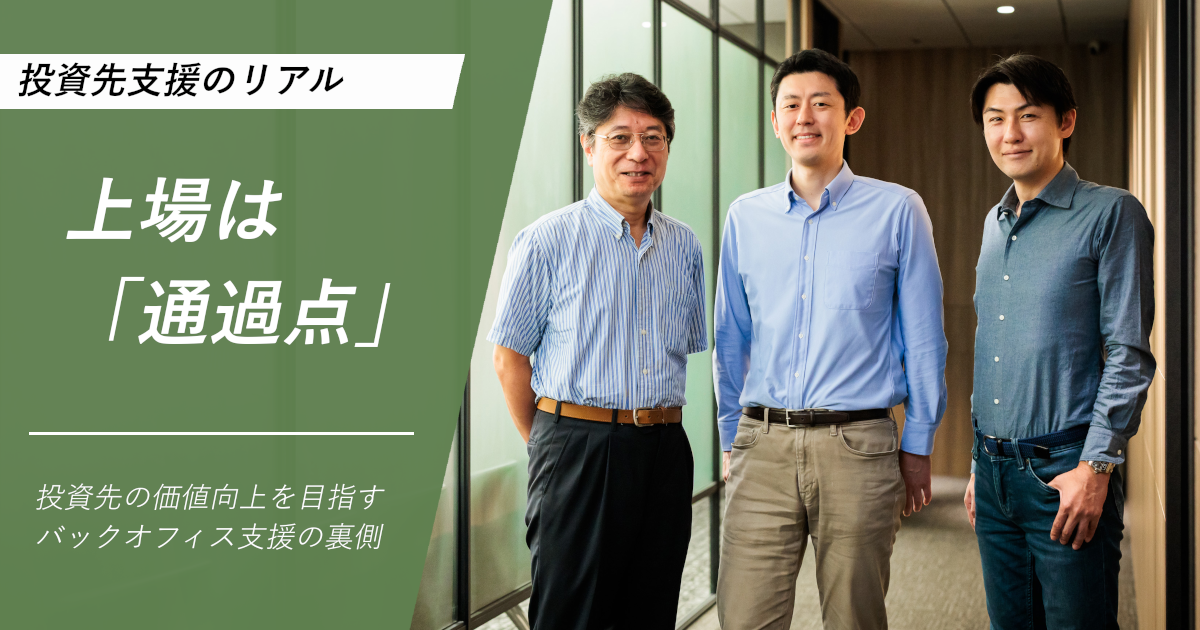
A strong administrative structure is essential for a growing organization.
People tend to focus on the glamorous main stage, but if the foundation supporting that stage is weak, even a technology that could revolutionize an industry may fail to have an impact.
Furthermore, startups often prioritize business growth to such an extent that they struggle to find the time and resources to strengthen their administrative structures.
In this article, Eichi Katano, Hiroki Setoyama, and Yuta Seimiya from JAFCO's Back Office Support team discuss the functions and stance of our "back office support" initiatives.
【Profiles】
Eichi Katano, Business Development Division, JAFCO Group Co., Ltd.
After working at an accounting firm for six years and obtaining his tax accountant certification, Mr. Katano joined JAFCO in 1991 and has consistently been involved in supporting portfolio companies with their IPO preparations. He also supports the investment division by planning capital policies and exit schemes.
Hiroki Setoyama, Business Development Division, JAFCO Group Co., Ltd.
Mr. Setoyama joined JAFCO in 2020. In his previous role at Ernst & Young ShinNihon LLC, he was involved not only in auditing but also in IPO quality control within the IPO supervision department. He also has experience on secondment at the Listing Examination Department of Japan Exchange Regulation. Currently, he is engaged in back-office structuring support, IPO preparation support, and support for the investment division to enhance the corporate value of portfolio companies. He is a Certified Public Accountant and a member of the IPO-related Business Support Project Team of the Tokyo Chapter of The Japanese Institute of Certified Public Accountants.
Yuta Seimiya, Business Development Division, JAFCO Group Co., Ltd.
Mr. Seimiya joined JAFCO in 2024. Before joining, he was at a major auditing firm, where he engaged in accounting audits for clients in a wide range of industries, short reviews, and IPO advisory services. He also contributed to knowledge dissemination through writing books, contributing articles to accounting journals, and speaking at training sessions and seminars. During a secondment to Japan Exchange Regulation, he was in charge of the listing examination for companies applying for a listing on the Tokyo Stock Exchange. Currently, he is mainly in charge of back-office structuring and IPO preparation support for portfolio companies. He is a Certified Public Accountant.
The Back Office Is the "Foundation" of Corporate Growth: Partnering from Administrative Structure Building to IPO Preparation
A Strong "Administrative Structure" Is Crucial for Growth
—First, could you give us an overview of the support provided by the back office support team?

Katano: Generally, when people hear "back office support," they might think it's all about "preparing for an IPO." However, a back office is fundamentally necessary for a company to grow, regardless of whether it plans to go public. While we do work with our portfolio companies to prepare listing application documents and build governance and internal control systems, the essence of our work is "building the foundation for the portfolio company's growth."
Setoyama: Our support can be broadly divided into two categories: "back office setup" during the seed and early stages, and "IPO preparation" during the middle and later stages.
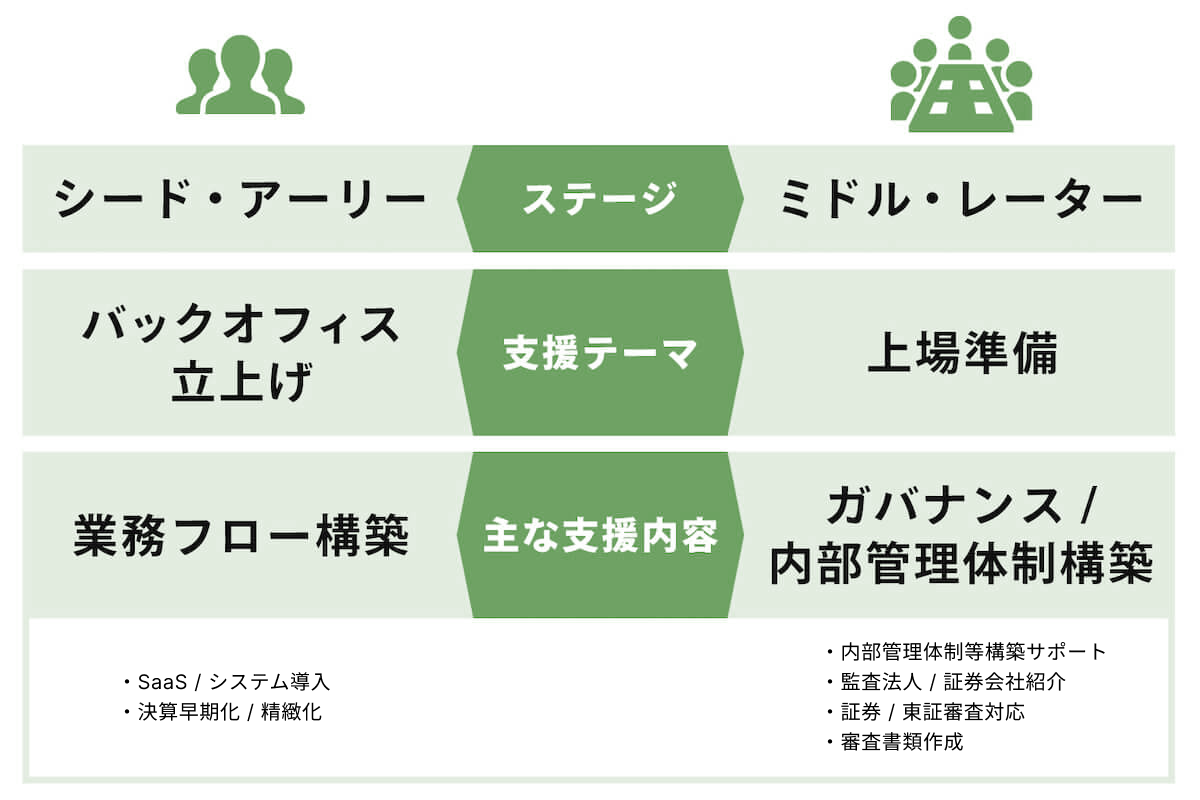
An IPO Is Just a Milestone: We Support What's Necessary to Increase Corporate Value
—Could you tell us about the details of each type of support?

Setoyama: First, during the back office setup phase, we provide support for building "systems." Specifically, we help establish business workflows to expedite monthly closings and build a management accounting system so that management decisions can be made in a timely manner.
In this phase, since the company needs to advance its business without an established business and revenue base, we support the creation of a foundation (= system building) that allows them to grasp their current management situation in real time and make decisions on the direction to take.
—Next, could you provide specific details about IPO preparation support?
Setoyama: For IPO preparation, we mainly divide the process up to the listing into stages and provide support tailored to each one.
For example, in the N-3 period, we support the establishment of the internal control system that audit firms require before concluding an audit contract, or we assist with the audit firm's short review.
From the N-2 period, when preparations intensify, we support the establishment of governance and internal control systems for the transition from a private to a public company, providing assistance toward the portfolio company's IPO.
During the securities and Tokyo Stock Exchange examinations that take place from the N-1 period onward, we provide support for handling the review process. However, from N-1 onward, it is a phase where the portfolio company must handle matters themselves, so our basic stance is to provide support only when they run into trouble.
Katano: As another example from the past, I have also been involved up to the first interviews for CFO recruitment, in collaboration with the portfolio company's accounting and HR personnel, as well as JAFCO's HR support team.
—What do you keep in mind when supporting portfolio companies?
Setoyama: When building a governance and internal control system, we make a conscious effort not to provide textbook advice. Instead, we provide support for establishing an "effective" governance and internal control system that is tailored to the specific situation of that portfolio company.
Ultimately, the risks that can arise in business vary from company to company, so if you don't build a governance and internal control system that matches the company's situation, it could end up being nothing more than a "castle in the air."
—What is the frequency and depth of your involvement with portfolio companies?
Katano: It varies. For example, if there aren't many issues to discuss yet, we might check in at a monthly regular meeting. If they are entering a phase of full-scale IPO preparation, we might check their progress weekly and provide support for any delayed parts.
The support required also varies depending on the portfolio company's situation, so we get involved in a way that meets their specific problems and needs.
Setoyama: We are not in a position to provide support after the listing, so it's a prerequisite that the portfolio company must be able to operate its own processes and systems, and our support is geared toward achieving that. However, it is also a fact that overcoming the hurdle of an IPO, which is just one milestone, can be quite difficult, so we provide support according to the portfolio company's situation.
JAFCO's Back Office Support: A System That Has "Evolved" with the Times
From a History of Support Since Our Founding, We Organized a Specialized Back Office Team
—Could you tell us about the history of back office support at JAFCO?
Katano: The current structure is based on the back office support that JAFCO began providing as part of IPO preparations around the 1990s. Later, this function was spun off into a subsidiary that provided IPO preparation, human resource introduction, and temporary staffing services not only to our portfolio but to various companies. In 2010, we brought it back in-house.
We made a fresh start by specializing in supporting our portfolio companies, and at the same time, we merged with the previously separate functions of sales support, portfolio research, and HR to form what is now "BD (Business Development)."
—What changes came about from bringing portfolio support in-house?
Katano: Previously, our model was to "provide support for a fee," so the scope of our assistance was mainly limited to what was defined in the contract. However, unexpected events and unforeseen accidents are common when aiming for an IPO. By bringing the function in-house, we became able to respond flexibly when a company is in trouble and offer consultation more casually, enabling more intensive support.
The "form" of our support may have changed, but the fact that we have continued to provide back office support with a specialized team is, I believe, a strength of JAFCO compared to other VCs.
Our Investment Policy May Change, but Our Support Style of "Respect for Entrepreneurs" Remains Constant
—Speaking of changes, JAFCO shifted its investment policy from "diversified investment" to "selective and focused investment" around 2010. Did this affect the nature of your back office support?
Katano: No, the fundamental philosophy of "respect for entrepreneurs" has remained unchanged. For example, when our opinion differs from that of an entrepreneur, we don't impose our views from a top-down perspective, saying, "This is how it should be," or "This is all we can do." Instead, we value discussing where the goal is and what is needed to get there, and proceeding with mutual trust.
Currently, JAFCO focuses on investing in seed and early-stage startups. Startups often have to prioritize business growth, and strengthening their administrative structure can be put on the back burner. That is precisely why I believe our "collaboration" with the back office support team can help them build a strong administrative structure.
Setoyama: If anything, I think the shift to "selective and focused investment" has deepened our involvement with each portfolio company. By leveraging the back office support expertise that JAFCO has cultivated, we hope that entrepreneurs can concentrate on their business, which in turn leads to business growth, an IPO, and further growth with the IPO as a milestone.
—Mr. Seimiya, you moved from an audit firm to JAFCO in 2024. Now that your position in relation to companies preparing for an IPO has changed, what have you observed?
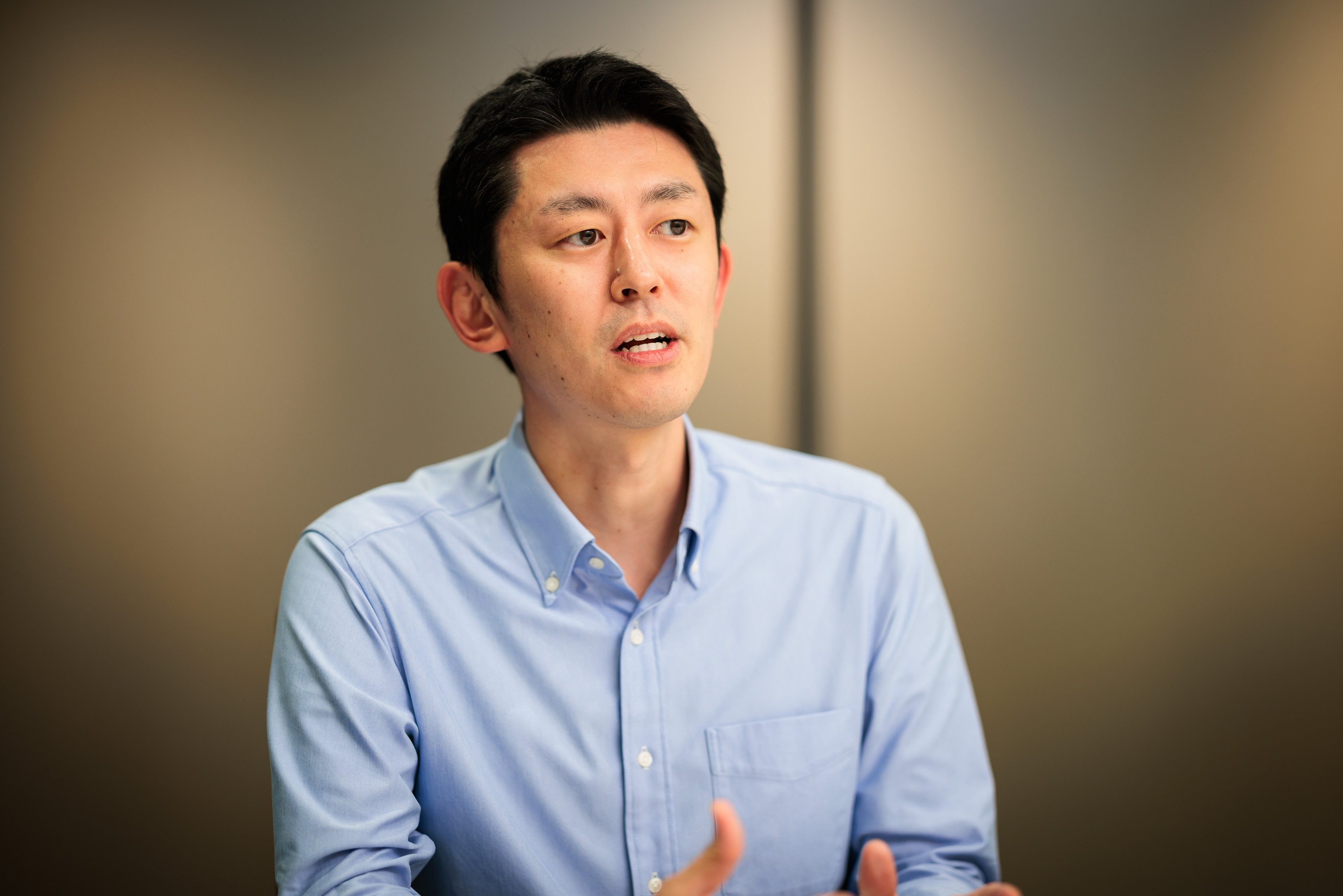
Seimiya: Compared to my previous job, I now have more opportunities to interact with companies at an earlier stage. In many of these cases, the back office structure is handled by a minimum number of people.
If the back office structure is insufficient, the ability to support the sales and business departments weakens, which can hinder strong growth. It can also lead to legal violations, troubles, or losses that could have been prevented, becoming an unexpected brake on business promotion. Especially for early-stage companies, the impact of such problems is greater due to their smaller scale.
The importance of building an appropriate back office structure from an early stage to establish a sufficient business and revenue base for the future is something I felt in my previous role, and I feel it anew now that I've joined JAFCO and have more contact with startups.
Becoming an Organization That Can Provide a Wide Range of Portfolio Support with Experienced Partners
Further Returning JAFCO's Accumulated Knowledge to Our Portfolio Companies
—Based on your journey so far, please tell us about the "future" of back office support.
Setoyama: Currently, since our team is not that large, we mainly provide support to companies in the period just before their IPO. In the future, we are working to enhance our structure so that we can provide deeper support to more portfolio companies.
Especially in the seed and early stages, resources are often lacking. Therefore, we want to team up with JAFCO's partners to enhance our support system for many portfolio companies and provide assistance with both operations and system building.
Specifically, we have started an initiative in collaboration with a major BPO provider to connect our portfolio with cloud workers for back office roles. We are also working to expand our contact with personnel interested in back office work at startups and are trying to provide a space where they can have a simulated experience of startup operations to bridge the gap with actual work. By taking the lead in these initiatives, we hope to involve audit firms, other VCs, and experts in various fields to further enrich our support for portfolio companies and startups facing challenges in building their back office organizations.
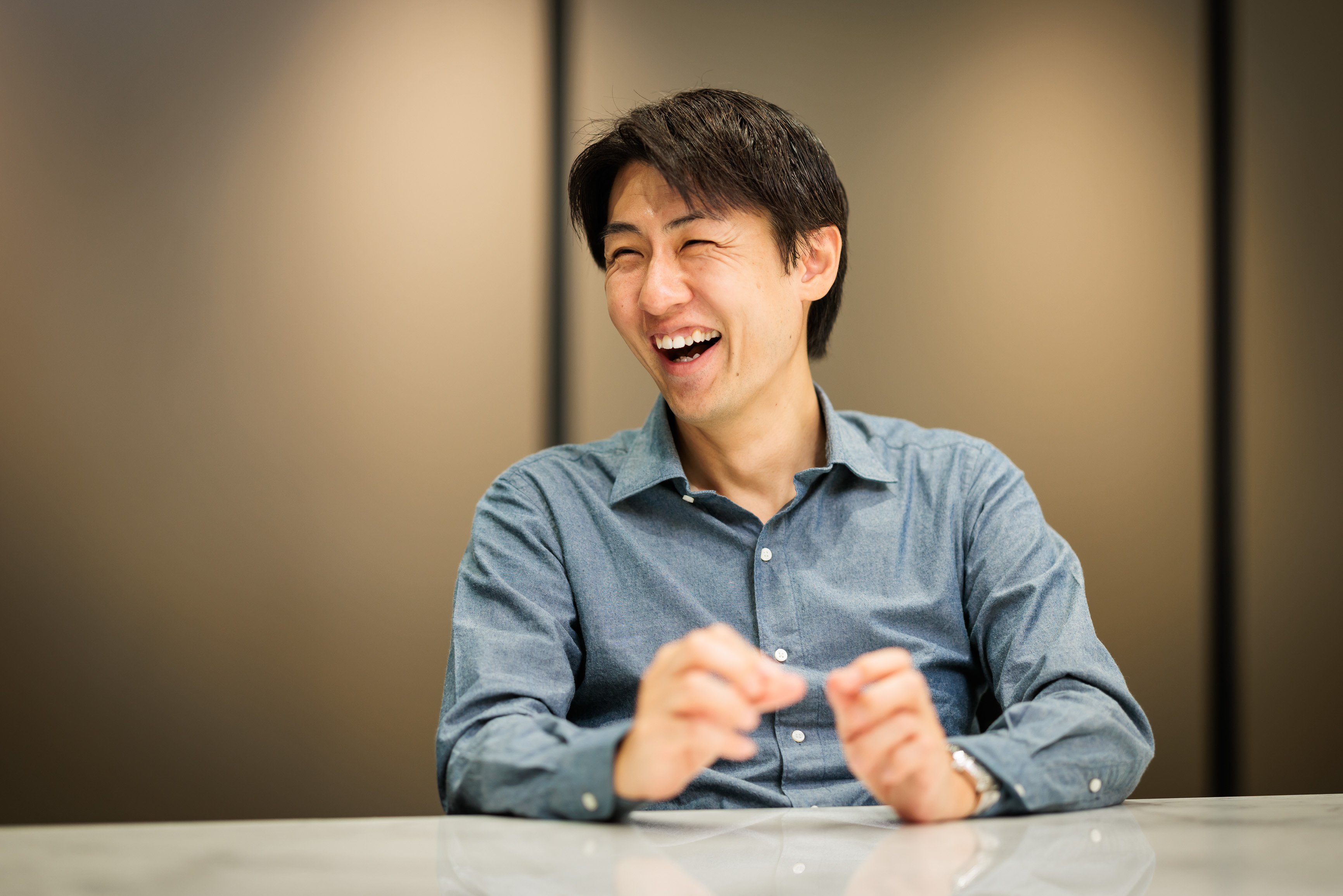
Katano: Back office work, by its nature, tends to become person-dependent and inefficient, and we often hear people ask, "Where do I even start?"
JAFCO has experience supporting various portfolio companies and knows of over 4,200 cases (including over 1,000 listed companies). Of course, not all of them had a smooth journey to listing; there were various challenges. That's why we want to contribute to human resource development from an "OJT" perspective, leveraging our knowledge of both what went well and what didn't.
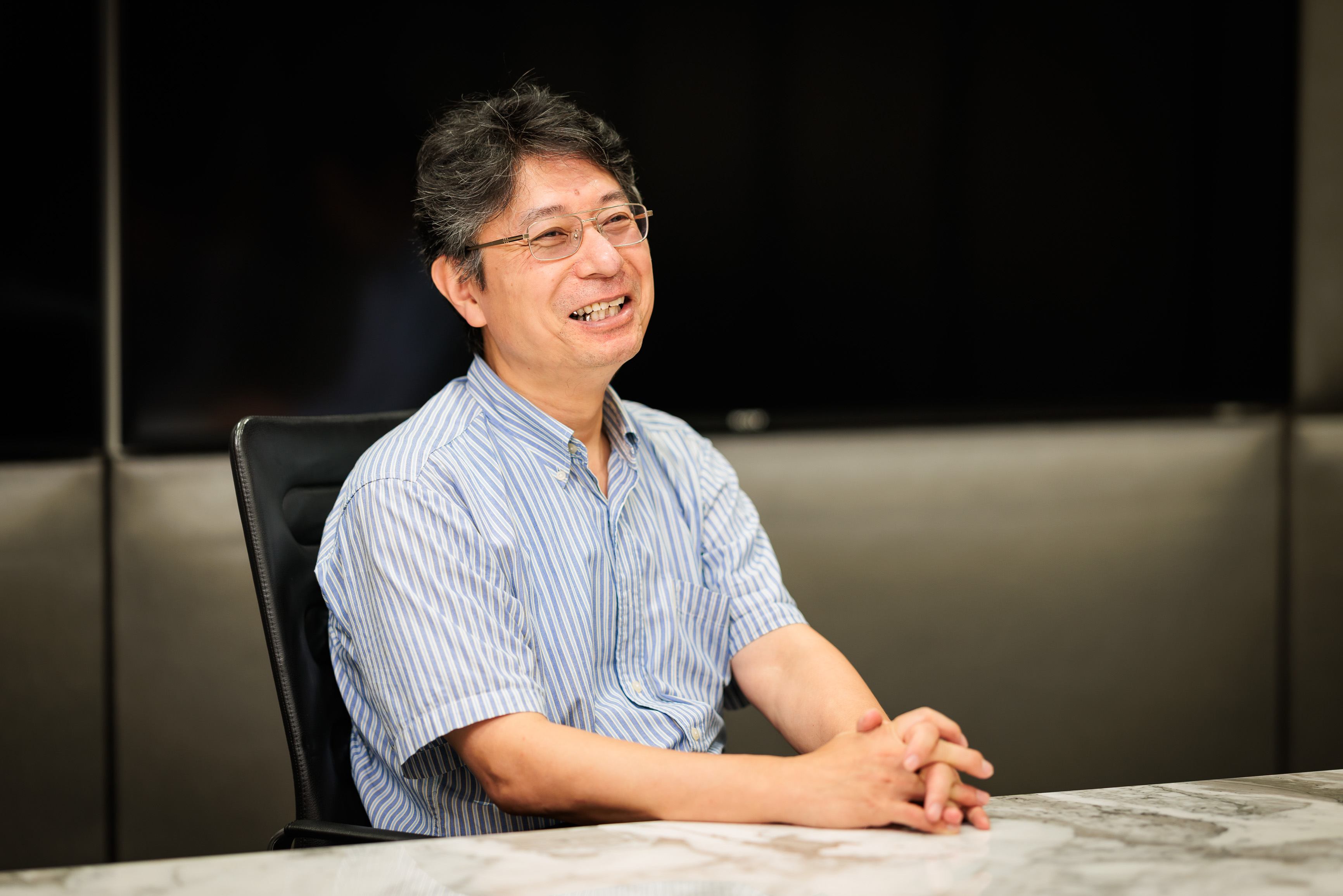
Seimiya: In addition to individual support for portfolio companies, JAFCO also holds study sessions for them. An IPO requires a very wide range of knowledge and expertise. We invite relevant parties and experts well-versed in the IPO field, such as from exchanges, securities firms, financial institutions, and audit firms, to speak on topics ranging from basic content to recent cases and trends for the benefit of our portfolio companies. When attending in person, these study sessions also serve as an opportunity for people from portfolio companies aiming for the same goal of an IPO to connect with each other.
—Thank you. Lastly, could you please give a message to entrepreneurs considering fundraising from JAFCO?
Setoyama: Building a back office structure is essential both for accurately grasping the current state of your business and for establishing a solid business and revenue base. That said, an excessive structure is not necessary. It's important to build a system that matches the company's phase and situation, with a focus on advancing the business. I would like to tell them that we can build an appropriate system together, taking their company's situation into account.
Seimiya: After the investment is executed, JAFCO becomes a partner on the same ship. Not only the capitalists but also support members like us will work as one team to overcome various challenges together and enhance corporate value.
Katano: JAFCO considers an investment to be the "starting point." We have a stance of doing whatever it takes for a company to grow, so if you have even the slightest problem or concern, I want you to make use of JAFCO.
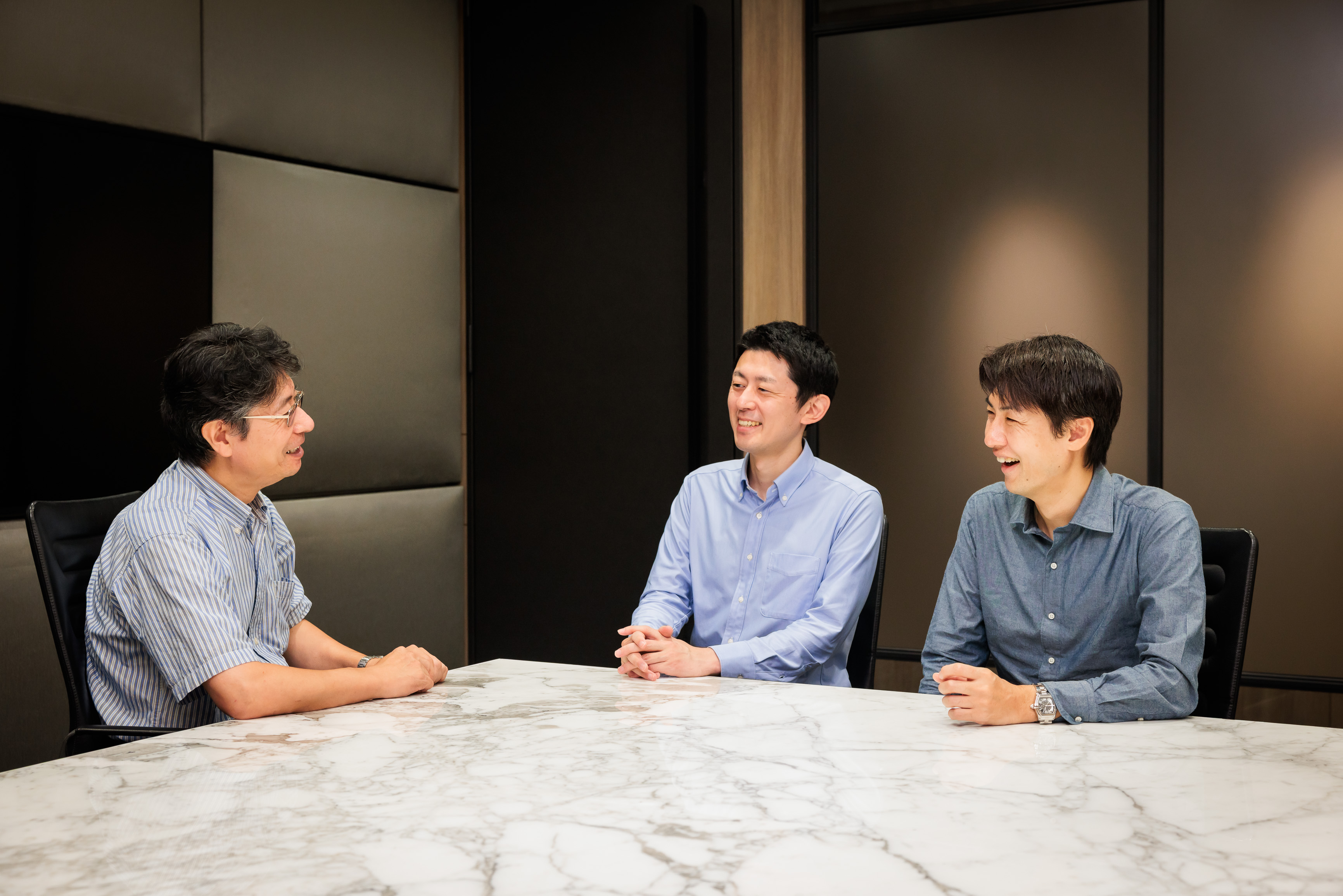
Related Articles
-
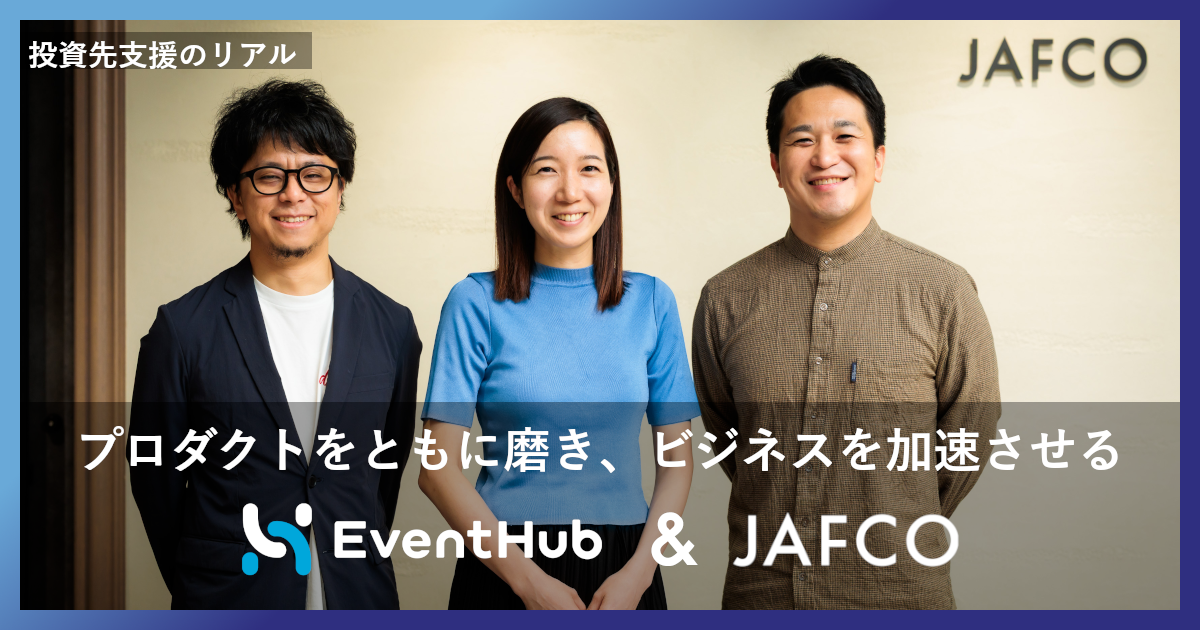
The Reality of Venture Support
Polishing Products Together and Accelerating the Business: EventHub’s Challenge, Backed by JAFCO’s User-Centric Support
-
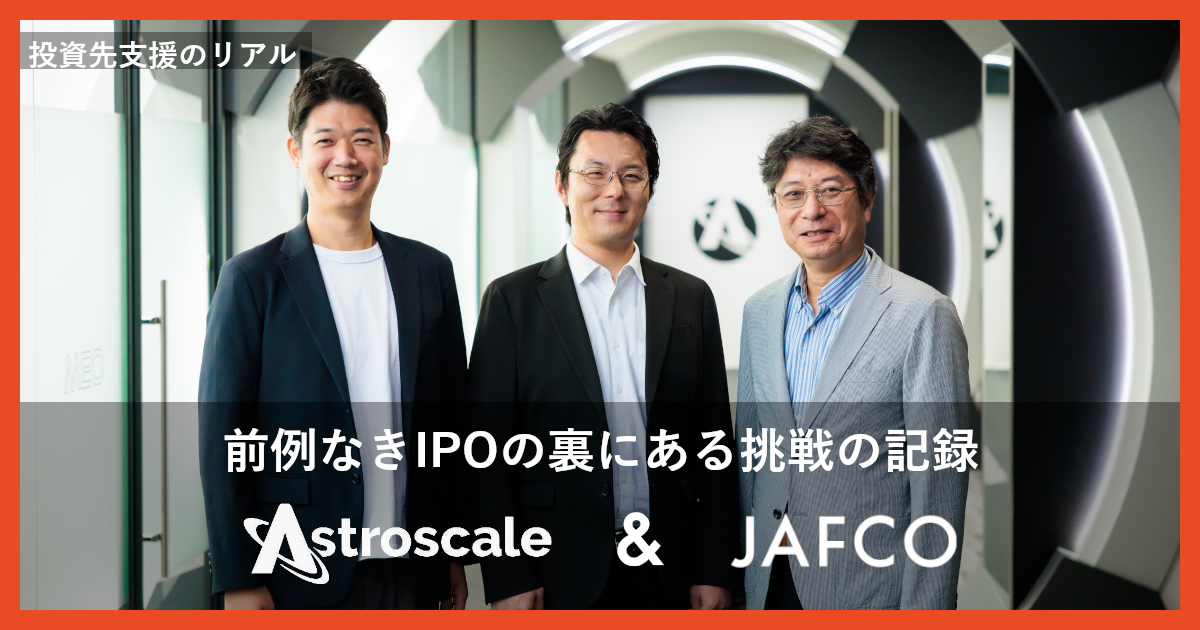
The Reality of Venture Support
True Partnership in Uncharted Territory: The Challenge Behind the World’s First Space Debris Removal and the Journey to the IPO
-

The Reality of Venture Support
How to Apply "Leverage" to Both People and the Organization: The Role of HR Support in Enhancing Portfolio Company Value
-

The Reality of Venture Support
The Basis of Support Is Creating Business Opportunities—How We Create That Crucial "First Meeting" for Startups
-
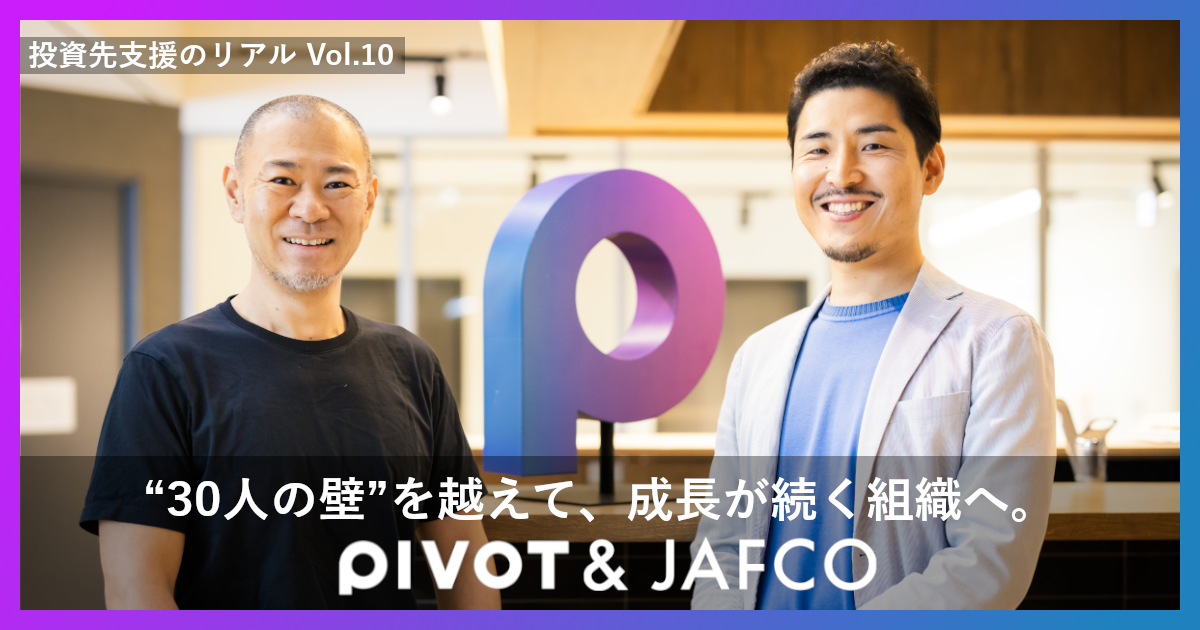
The Reality of Venture Support
Beyond the "30-Person Wall": How Business Media PIVOT Partnered with JAFCO to Strengthen Management and Reshape Their Organization, Guided by a "Sherpa-like" Presence Aiming for Greater Heights